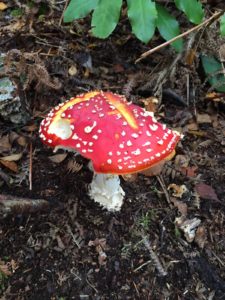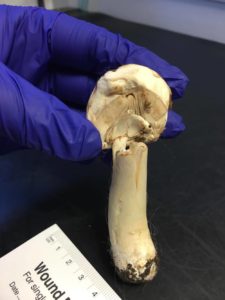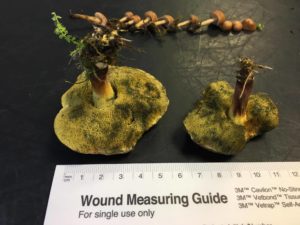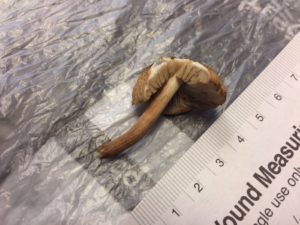Mushroom Toxicities
 Mushroom’s and toadstools are the fruit bodies of fungi. They develop throughout the Autumn in warm and wet weather, which we have had ample of over the last few weeks! When ingested, mushrooms and toadstools have the potential to be toxic and can cause a variety of different problems dependent on the type of mushroom they have eaten.
Mushroom’s and toadstools are the fruit bodies of fungi. They develop throughout the Autumn in warm and wet weather, which we have had ample of over the last few weeks! When ingested, mushrooms and toadstools have the potential to be toxic and can cause a variety of different problems dependent on the type of mushroom they have eaten.
Some mushrooms cause relatively little effect , some induce gastrointestinal signs such as vomiting and diarrhoea whilst others can have behavioural, neurological or hallucinogenic effects. Unfortunately, some can be extremely toxic resulting in a delayed development of kidney and liver failure.
As a result, it is really important to find out which mushroom your pet has eaten. This helps us to determine how serious the potential consequences might be and therefore how best to target our treatment.
The problem we face is that there are thousands of different types of mushroom and toadstool and it can be difficult to identify the specific species. Often expert knowledge is required to do this and it is important to provide us with as much information as possible.
Here are some factors which can help us to identify the type of fungus:
 What type of habitat was the fungus growing in, what was it growing on and what type of tree was it growing near? .
What type of habitat was the fungus growing in, what was it growing on and what type of tree was it growing near? .- The size, shape and underside features of the mushroom
- The consistency and texture of the flesh
Therefore, to help provide more information it is extremely helpful to take pictures of the mushroom in-situ and close up. Once this has been done digging up a sample and taking it with you to the vets is highly recommended. If your pet has eaten the only mushroom present then remnants in their vomit might also be helpful. Please handle mushrooms carefully and wash hands after touching.
Mushroom Toxicities at Hollybank
Recently we have had a number of inquisitive pets who decided to sample some mushrooms. For each pet the type of mushroom(s) were identified with the help of a mycologist.
 Oscar is a beautiful Ragdoll who decided to bring home a mushroom following his daily expeditions, of which, of course he had sampled! Oscar appeared fine but within the next few hours began to excessively salivate and froth at the mouth. On presentation with us he was distressed and his breathing was faster than it should be. The mushroom Oscar had eaten was identified as one that causes gastrointestinal signs and is commonly referred to as ‘The Sickener’. Oscar’s signs were associated with nausea and he responded really well to an anti-sickness injection and TLC. Oscar’s experience didn’t deter him from eating another of these mushrooms a few weeks later! Unfortunately, mushrooms can come up very quickly and due to the free roaming nature of cats it can be very difficult to stop them eating things they shouldn’t.
Oscar is a beautiful Ragdoll who decided to bring home a mushroom following his daily expeditions, of which, of course he had sampled! Oscar appeared fine but within the next few hours began to excessively salivate and froth at the mouth. On presentation with us he was distressed and his breathing was faster than it should be. The mushroom Oscar had eaten was identified as one that causes gastrointestinal signs and is commonly referred to as ‘The Sickener’. Oscar’s signs were associated with nausea and he responded really well to an anti-sickness injection and TLC. Oscar’s experience didn’t deter him from eating another of these mushrooms a few weeks later! Unfortunately, mushrooms can come up very quickly and due to the free roaming nature of cats it can be very difficult to stop them eating things they shouldn’t.
 Archie is a lovely English Shepherd dog who came to us at Hollybank due to intermittent vomiting. Due to the warm weather there had been mushrooms growing in the garden and there was the possibility that he had eaten them. There were a number of different types; luckily two were identified as non toxic and one was associated with low levels of nausea. The mushroom therefore may or may not have been related to Archie’s clinical signs, being a one year old inquisitive dog he could have licked, chewed or eaten anything! However, it is always important to check. Archie recovered well with symptomatic treatment and despite the sudden flourish of mushrooms he and his owner are managing to avoid them.
Archie is a lovely English Shepherd dog who came to us at Hollybank due to intermittent vomiting. Due to the warm weather there had been mushrooms growing in the garden and there was the possibility that he had eaten them. There were a number of different types; luckily two were identified as non toxic and one was associated with low levels of nausea. The mushroom therefore may or may not have been related to Archie’s clinical signs, being a one year old inquisitive dog he could have licked, chewed or eaten anything! However, it is always important to check. Archie recovered well with symptomatic treatment and despite the sudden flourish of mushrooms he and his owner are managing to avoid them.
 Otto is a gorgeous Hungarian Vizsla puppy who of course at his age is intrigued by everything and anything! Otto quickly swallowed a mushroom from the garden before his owners were able to get it out of his mouth! He began vomiting not long after and on presentation to Hollybank had also developed diarrhoea and abdominal pain.
Otto is a gorgeous Hungarian Vizsla puppy who of course at his age is intrigued by everything and anything! Otto quickly swallowed a mushroom from the garden before his owners were able to get it out of his mouth! He began vomiting not long after and on presentation to Hollybank had also developed diarrhoea and abdominal pain.
The mushroom Otto had eaten was known to cause vomiting and diarrhoea however could also be more serious. In dogs, the toxin can affect cells in nerves and in muscles. This meant it had the potential to cause muscle tremors, a dangerously low heart rate and in some cases, be fatal. A drug called Atropine to help counteract the slow heart rate was recommended. Otto was a very lucky puppy and never progressed to show any of these symptoms. We managed his gastrointestinal signs with supportive treatment and he soon felt much better. Otto is doing really well after his mushroom escapades but is still managing to keep his owners busy.
**Please do not try to match mushrooms to the ones shown in these case reports, an expert has helped in the identification of each species and subtle changes and features will separate each type.
If your pet has eaten a mushroom then please follow the above advice and phone us on 01606 880890




